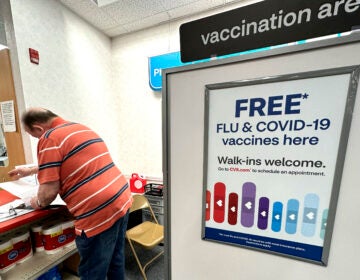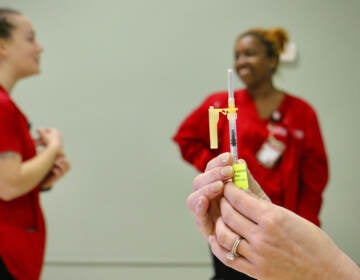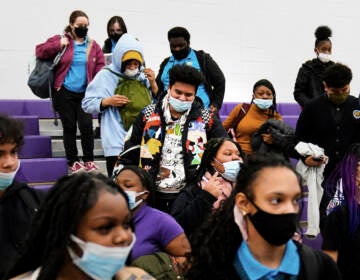Coronavirus update: N.J. will shut down nonessential businesses
New Jersey also joined with Pennsylvania, New York and Connecticut to request $100 billion in cash assistance from the federal government.
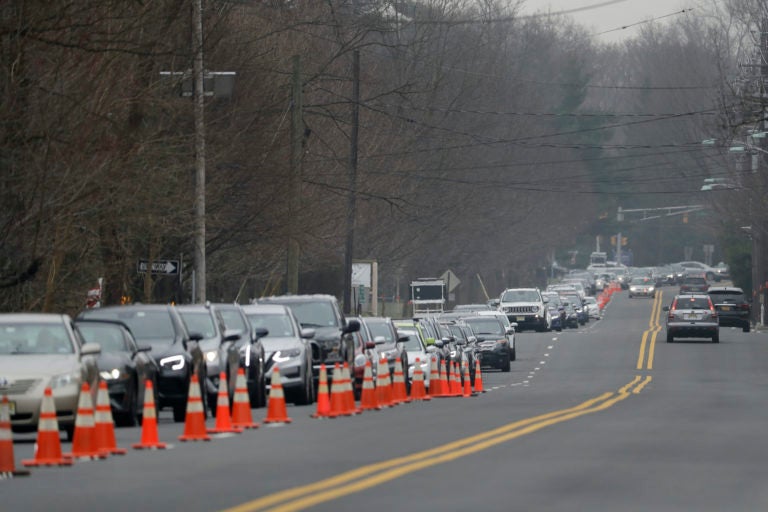
A long line of cars waits to enter a drive-through COVID-19 coronavirus testing center in Paramus, N.J., Friday, March 20, 2020. (Seth Wenig/AP Photo)
Updated 5:02 p.m.
New Jersey Gov. Phil Murphy said Friday he will issue orders to shut down all non-essential businesses in the state and limit gatherings to 10 or fewer people, although he left the timing vague.
The preview of a further crackdown came as confirmed COVID-19 cases in New Jersey swelled by 155 overnight, to a total of 890. The death toll rose to 11.
To date, there are also 293 confirmed cases in Pennsylvania and 39 in Delaware.
It’s not clear yet when the new rules will start being enforced. Murphy said details of the plan are still being finalized and would be released within the next 24 hours.
What is clear is that the rules would be even stricter than the state’s current ban on gatherings over 50 people, sweeping restrictions on business operations, and plea to avoid personal travel after 8 p.m.
“It brings me no joy, but we have no choice,” Murphy said at an afternoon news conference. “We will, within the next 24 hours, further tighten the screws in terms of the social distancing … It has absolutely proven to be the best way we can get out ahead of this virus and crack the back of it.”
Many nonessential businesses have already been reduced to operating between 5 a.m. and 8 p.m., while a wide range of venues have been shut down altogether — everything from gyms and casinos to malls and nail salons.
Bars and restaurants cannot offer dine-in services and must stick to takeout.
The goal, Murphy has said, is to slow the spread of the new coronavirus and make sure that the health care system is not overwhelmed with patients.
Cases expected to hit ‘many thousands’ as testing expands
In the short term, though, confirmed cases will rise, Murphy said Friday.
“The numbers will go into the many thousands. We’ve been predicting that for some time,” he said. “And this is not necessarily, on its surface, a bad thing. The more information we have, the better we’ll be able to respond to this crisis.”
Murphy attributed part of the increase to expanded testing capacity. For example, the state’s first drive-through testing site opened in Bergen County on Friday morning and administered 600 tests, he said.
So many people flooded the site that officials had to start turning away cars at noon, by which point thousands of vehicles had lined up to get tested, NJ.com reported.
“To say there was pent-up demand would be the understatement of the century,” Murphy said, adding that people must be symptomatic or have medical clearance in order to get tested. He urged the “worried well” to stay home.
A second drive-through testing site will open Monday morning at PNC Bank Arts Center in Holmdel.
At the same time, Murphy said the state had partnered with two private labs, BioReference and LabCorp, to process tests faster.
“This is a game changer in our overall efforts,” the governor said. “Lab capacity is no longer an issue in New Jersey as it is nationwide. Our focus can now move to increasing specimen collection statewide.”
Also Friday, Murphy joined with the governors of Pennsylvania, New York and Connecticut to ask President Donald Trump and congressional leaders for at least $100 billion in cash assistance to deal with the pandemic.
“Without flexible and immediately accessible resources,” the governors wrote in a letter, “states may be left with no choice but to lay off thousands of employees, be unable to pay employees who are providing life-sustaining services, slash funding for education and transportation, and substantially reduce critical services — just as our residents need our support the most.”
N.J. mulling release of county prisoners
Chief Justice Stuart Rabner on Friday asked prosecutors, public defenders and other groups to weigh in on a proposal to commute or suspend county jail sentences in light of the dangers posed to prisoners by the new coronavirus.
People serving sentences in county jail — as opposed to state prison — have typically been convicted of low-level indictable offenses or even municipal violations.
In his request for input, Rabner proposed immediately releasing any defendant serving a county jail sentence and leaving it up to a judge to decide whether or not the person has to return later to finish that time.
The proposal was first put forward by the New Jersey Office of the Public Defender. Rabner gave interested parties until Monday at noon to submit briefs.
WHYY is your source for fact-based, in-depth journalism and information. As a nonprofit organization, we rely on financial support from readers like you. Please give today.


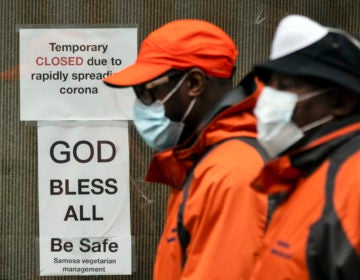
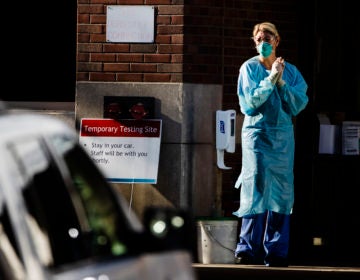
![CoronavirusPandemic_1024x512[1]](https://whyy.org/wp-content/uploads/2020/03/CoronavirusPandemic_1024x5121-300x150.jpg)
